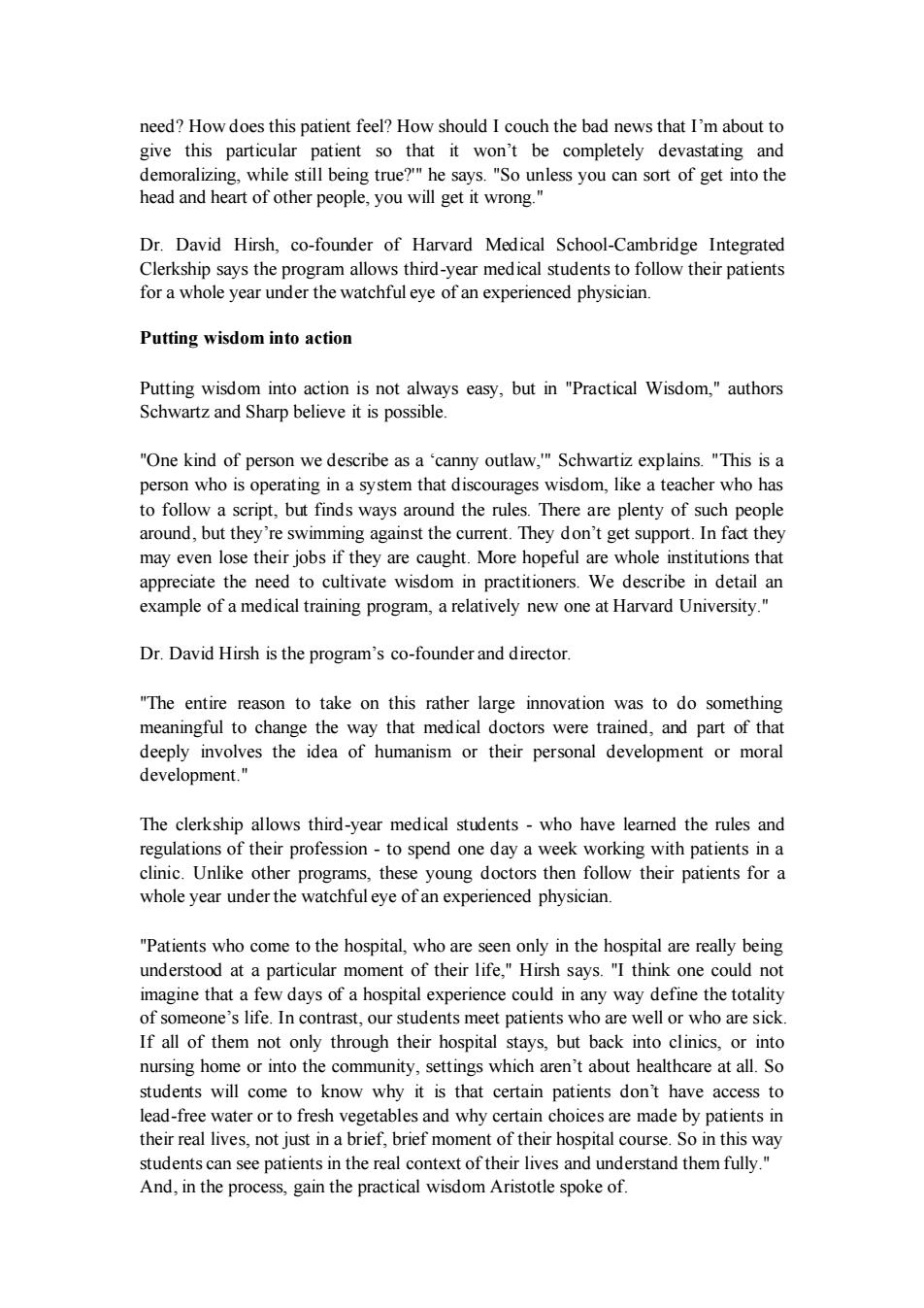正在加载图片...

need?How does this patient feel?How should I couch the bad news that I'm about to give this particular patient so that it won't be completely devastating and demoralizing,while still being true?""he says."So unless you can sort of get into the head and heart of other people,you will get it wrong." Dr.David Hirsh,co-founder of Harvard Medical School-Cambridge Integrated Clerkship says the program allows third-year medical students to follow their patients for a whole year under the watchful eye of an experienced physician. Putting wisdom into action Putting wisdom into action is not always easy,but in "Practical Wisdom,"authors Schwartz and Sharp believe it is possible. "One kind of person we describe as a 'canny outlaw,""Schwartiz explains."This is a person who is operating in a system that discourages wisdom,like a teacher who has to follow a script,but finds ways around the rules.There are plenty of such people around,but they're swimming against the current.They don't get support.In fact they may even lose their jobs if they are caught.More hopeful are whole institutions that appreciate the need to cultivate wisdom in practitioners.We describe in detail an example of a medical training program,a relatively new one at Harvard University." Dr.David Hirsh is the program's co-founder and director. "The entire reason to take on this rather large innovation was to do something meaningful to change the way that medical doctors were trained,and part of that deeply involves the idea of humanism or their personal development or moral development." The clerkship allows third-year medical students who have learned the rules and regulations of their profession-to spend one day a week working with patients in a clinic.Unlike other programs,these young doctors then follow their patients for a whole year under the watchful eye of an experienced physician. "Patients who come to the hospital,who are seen only in the hospital are really being understood at a particular moment of their life,"Hirsh says."I think one could not imagine that a few days of a hospital experience could in any way define the totality of someone's life.In contrast,our students meet patients who are well or who are sick. If all of them not only through their hospital stays,but back into clinics,or into nursing home or into the community,settings which aren't about healthcare at all.So students will come to know why it is that certain patients don't have access to lead-free water or to fresh vegetables and why certain choices are made by patients in their real lives,not just in a brief,brief moment of their hospital course.So in this way students can see patients in the real context of their lives and understand them fully." And,in the process,gain the practical wisdom Aristotle spoke of.need? How does this patient feel? How should I couch the bad news that I’m about to give this particular patient so that it won’t be completely devastating and demoralizing, while still being true?'" he says. "So unless you can sort of get into the head and heart of other people, you will get it wrong." Dr. David Hirsh, co-founder of Harvard Medical School-Cambridge Integrated Clerkship says the program allows third-year medical students to follow their patients for a whole year under the watchful eye of an experienced physician. Putting wisdom into action Putting wisdom into action is not always easy, but in "Practical Wisdom," authors Schwartz and Sharp believe it is possible. "One kind of person we describe as a ‘canny outlaw,'" Schwartiz explains. "This is a person who is operating in a system that discourages wisdom, like a teacher who has to follow a script, but finds ways around the rules. There are plenty of such people around, but they’re swimming against the current. They don’t get support. In fact they may even lose their jobs if they are caught. More hopeful are whole institutions that appreciate the need to cultivate wisdom in practitioners. We describe in detail an example of a medical training program, a relatively new one at Harvard University." Dr. David Hirsh is the program’s co-founder and director. "The entire reason to take on this rather large innovation was to do something meaningful to change the way that medical doctors were trained, and part of that deeply involves the idea of humanism or their personal development or moral development." The clerkship allows third-year medical students - who have learned the rules and regulations of their profession - to spend one day a week working with patients in a clinic. Unlike other programs, these young doctors then follow their patients for a whole year under the watchful eye of an experienced physician. "Patients who come to the hospital, who are seen only in the hospital are really being understood at a particular moment of their life," Hirsh says. "I think one could not imagine that a few days of a hospital experience could in any way define the totality of someone’s life. In contrast, our students meet patients who are well or who are sick. If all of them not only through their hospital stays, but back into clinics, or into nursing home or into the community, settings which aren’t about healthcare at all. So students will come to know why it is that certain patients don’t have access to lead-free water or to fresh vegetables and why certain choices are made by patients in their real lives, not just in a brief, brief moment of their hospital course. So in this way students can see patients in the real context of their lives and understand them fully." And, in the process, gain the practical wisdom Aristotle spoke of